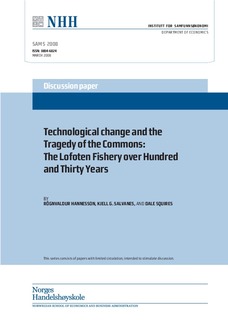Technological change and the tragedy of the commons: the Lofoten fishery over hundred and thirty years
Working paper
Permanent lenke
http://hdl.handle.net/11250/163138Utgivelsesdato
2008-03Metadata
Vis full innførselSamlinger
- Discussion papers (SAM) [657]
Sammendrag
Why did the Lofoten cod fishery in Norway – a fishery on one of the world’s richest spawning grounds -
remain less productive than alternative industries until the mid-1960s, despite important modernization of
the fleet and fishing gear, improvements in technology and institutional change? We analyze the effect of
technological change on labor and total factor productivity as well as exit and entry patterns using detailed
data for 130 years. Our findings support the important role of natural resources in productivity and
improvements in welfare in natural resource-based industries. The total factor productivity has risen faster
than labor productivity in the fishery, indicating that the considerable technological progress in this
industry has to some extent been neutralized by the decline in the fish stock. Open access to the fish
resource most probably led to this situation.
Utgiver
Norwegian School of Economics and Business Administration. Department of EconomicsSerie
Discussion paper2008:5
